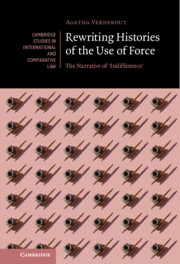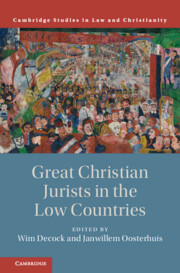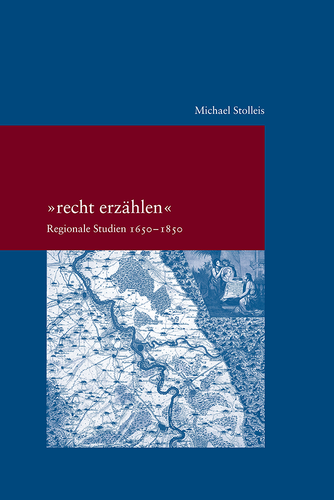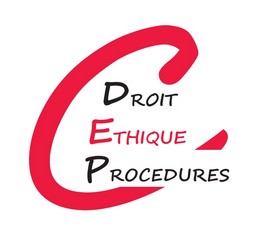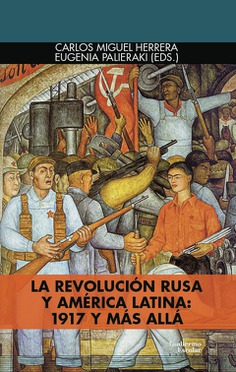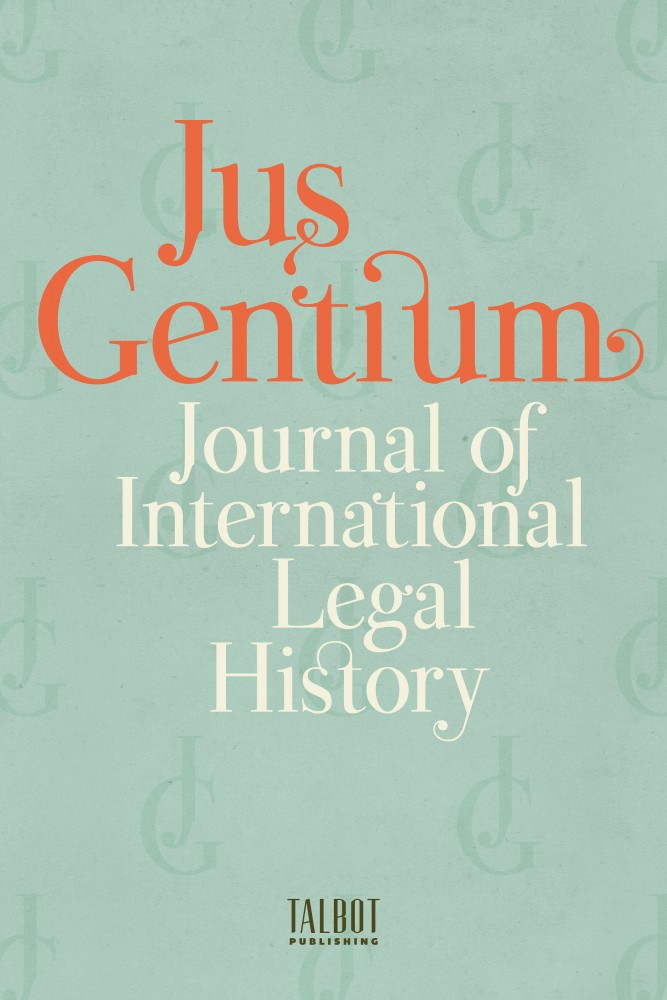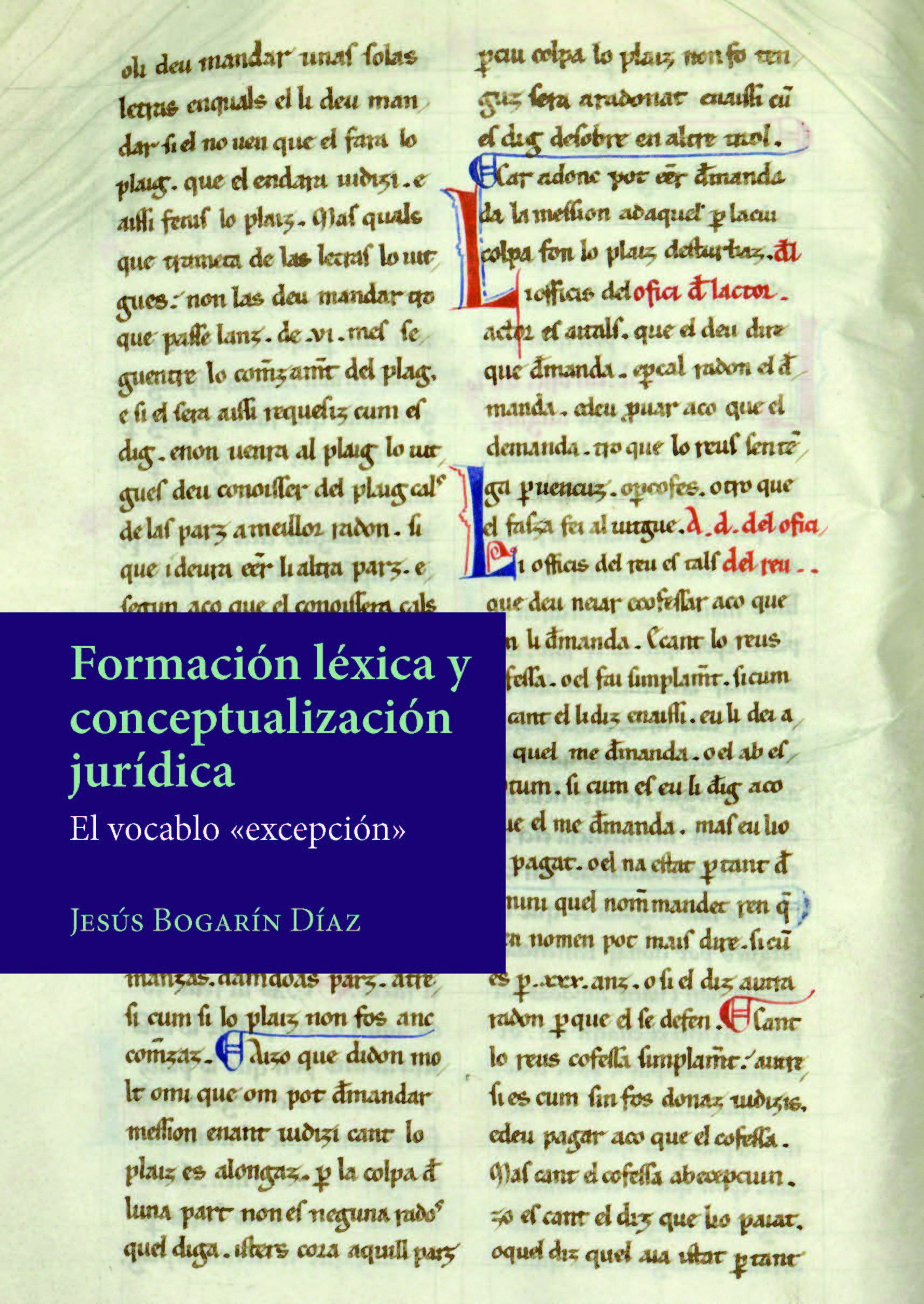Search
30 October 2021
CALL FOR BOOK REVIEWS EDITORS/COPY-EDITORS: Comparative Legal History (ESCLH/Routledge) (DEADLINE 30 NOV 2021)
29 October 2021
ARTICLE: Thomas DAHMS, "Diligent Bureaucrats and the Expulsion of Jews from West Prussia, 1772–1786" (German History XXXIX (2021), No. 3 (Sep), 335-357 (OPEN ACCESS)
Abstract:
Historiography has repeatedly highlighted the mitigating influence of the Prussian administration on Frederick the Great’s oppressive policies toward the Jews. Scholars have argued that officials frequently opposed the king’s discriminatory legislation and intentionally delayed its implementation. These actions, they claimed, were influenced by the Enlightenment humanism of the Prussian administrators and their training in natural law theories and mercantilist economics, both taught at German universities at the time. Such descriptions are central in the influential narrative of late eighteenth-century Prussia as a remarkably tolerant state that developed relatively lenient policies towards the Jews. This article challenges the traditional portrayal of the Prussian administration by examining the actions of three officials involved in the expulsion of several thousand Jews from the province of West Prussia between 1772 and 1786. It argues that the remarkably positive assessment of the Prussian bureaucrats and their role in the Jewish policies of the time needs significant revision. First, previous historiography has overstated the extent to which Prussian officials objected to the king’s discriminatory policies. Secondly, occasional instances of resistance from within the administration were mainly motivated by political, economic and demographic objectives or even careerist pursuits that had little to do with the Jewish communities. Lastly, the Prussian administrators did not merely adhere to economic principles or even to ideals of tolerance and humanity. To a significant extent, their actions were also influenced by anti-Jewish sentiment.
Read more here (DOI 10.1093/gerhis/ghab027).
(source: ESILHIL Blog)
28 October 2021
BOOK: Jenny Paola VALENCIA, El proceso de adopción del Código Civil en Colombia. Vientos de cambios en la cultura política y jurídica en el siglo XIX (México: Tirant lo Blanch, 2021). ISBN: 9788413785325, pp. 308, $ 449.00 MXN
ABOUT THE BOOK
Series: Historia del Derecho en América Latina
Este libro analiza la forma en la que el Código Civil se insertó en la cultura jurídica y política colombiana en el siglo XIX. No se ocupa tanto del estudio de su contenido, sino, más bien, del largo proceso de su adopción, desde los primeros intentos codificadores, a comienzos de la República, hasta el año 1887. En el texto se entiende la codificación como parte esencial de la configuración del Estado y se hace alusión a una multiplicidad de actores, escenarios y discusiones, así como a diferentes miradas a partir de las cuales se intentó estructurar una nueva sociedad con principios y valores propios. Finalmente, el lector encontrará en esta obra una referencia a las formas de publicación y circulación de la codificación, atendiendo a la materialidad y a los formatos en los que ésta viajó por la sociedad decimonónica colombiana.
ABOUT THE AUTHOR
Jenny Paola Valencia es historiadora de la Universidad del Valle, magister y doctora de historia de la Universidad de los Andes. En la actualidad es docente universitaria e investigadora posdoctoral adscrita al Grupo de Estudios de Literatura y Cultura Intelectual Latinoamericana (GELCIL) de la Universidad de Antioquia.
TABLE OF CONTENTS
Índice
Agradecimientos 17
Prólogo 19
Introducción 21
Capítulo 1 - Del Antiguo Régimen jurídico a la codificación
1. Características del entramado jurídico de la monarquía hispánica 47
2. Cuerpos normativos de la monarquía hispánica 54
3. El régimen borbónico y los inicios del desmantelamiento del antiguo orden jurídico 60
Capítulo 2 - El proceso de codificación y la organización del Estado en clave liberal
1. Previo a la codificación: escenario político y de cultura legal entre 1810-1845 74
2. Los primeros intentos codificadores y la crítica al régimen jurídico anterior 79
3. La búsqueda de una vuelta a la monarquía constitucional: el periodo de la recopilación
de leyes de la Nueva Granada, 1843-1845 90
4. La era codificadora en el siglo XIX: una historia conectada en Europa
e Hispanoamérica 97
5. La adopción del Código Civil 1857-1887: del federalismo a la Regeneración 103
Capítulo 3 - El Código Civil en la contienda Iglesia-Estado
1. Cambios jurídicos que iniciaron la separación entre la Iglesia y el Estado 121
2. La adopción del matrimonio civil 142
3. Inicios de un consenso frente a las relaciones con la Iglesia previo al Concordato 151
4. La Suprema Corte y la Procuraduría: resolución de conflictos entre la I
glesia y el Estado 159
Capítulo 4 - Difusión y circulación de una cultura legal y política de respeto y apego a la ley
1. Circulación de autores y textos jurídicos en los primeros años de la República 171
2. Bentham: utilitarismo y codificación 174
3. La filosofía moral como forma de circulación de una cultura jurídica 184
4. Rituales y prescripciones: la lectura de la Constitución y el Código Penal en
la plaza pública 201
Capítulo 5 - ¿Y cómo viaja el código?
El Código Civil como objeto textual y su circuito de difusión
1. La prensa oficial como tribuna parlamentaria 210
2. El Código por entregas: publicación en las Gacetas oficiales 215
3. El Código Civil como texto impreso 227
4. Formato, precio, imprentas y estructura de publicación del Código 234
Fuentes y bibliografía
Fuentes primarias 261
Bibliografía general 265
Anexo - “Modificaciones introducidas al Código de Bello por el Estado de Santander”
Sobre el matrimonio
Diferencias en el matrimonio y la filiación en los otros códigos 279
Índice de tablas e imágenes
Tabla 1. Sometimiento de eclesiásticos a la legislación 139
Tabla 2. Disposiciones sobre el matrimonio civil por Estados soberanos 146
Tabla 3. Publicación códigos de los Estados federales 236
Tabla 4. Estructura de publicación Doce Códigos de Cundinamarca 238
Imagen 1. Portada de los Doce Códigos del Estado de Cundinamarca 239
Imagen 2. Código Civil. Asamblea Magdalena 242
Imagen 3. Portada del Código Civil de Santander 242
Imagen 4. Portada del Código Civil de Panamá 243
Imagen 5. Portada del Código Civil de Bolívar 243
More information with the publisher.
CALL FOR PAPERS: International conference "(Un)fit to rule: themes of acceptance and rejection of rulers throughout history" - October 26th-28th, 2022 - The University of Belgrade Faculty of Law
The University of Belgrade Faculty of Law is opening a CALL FOR PAPERS for the international conference "(Un)fit to rule: themes of acceptance and rejection of rulers throughout history" to be held on October 26th -28th, 2022.
In 2022, it will be 700 years since King Stefan Uroš III Dečanski ascended the Serbian throne in 1322. It was not a simple succession, though: he had unsuccessfully rebelled against his father, King Stefan Uroš II Milutin in 1314, and, as punishment, he was blinded and exiled. He was thus believed no longer to be a candidate for the throne, but his vision was miraculously restored (it is now believed that he was not blinded completely, if at all) and he managed to conquer the throne after his father's death. This anniversary presents an occasion for a comparative overview of requirements for a ruler – or, from a different angle, circumstances that made a person unfit to take the throne or govern a country.
Our anniversary first brings physical disabilities to the fore. These could have impeded potential rulers from assuming the reins of power simply because they were presumed to prevent one from being an efficient ruler, particularly in the periods when a monarch was also a military leader, but also (as a result of ideas widespread in Christian Europe) because of the idealised perception of a monarch as God's chosen representative on Earth who had to embody perfection. There are, however, well-known examples that speak to the contrary, such as Béla II of Hungary, Enrico Dandolo or John of Bohemia. An even more sensitive subject is that of mental disabilities, which were viewed as an even greater hindrance to effective rulership. In some countries, an heir with serious mental health issues would be ex lege disqualified from inheriting, while in some places, particularly in the Modern era, an extensive regency was considered better than a squabble over the throne. The reactions of other political figures to a ruler whose mental health was visibly deteriorating, and thus to the fate of his or her reign, also make for an interesting subject.
The issue of gender must also be raised: while men were the default sovereigns in most countries of the world until well into the Modern Age, some countries accepted women on the throne when there was no suitable male heir; in some it was impossible and a more distant heir would be chosen. Finally, in some legal systems exceptional women did manage to rule, but had to go through a lot of effort to masculinize; their reign in order to be acceptable. Even in ancient Egypt, where women held a remarkably good legal position compared to the other polities of Antiquity, the first female pharaoh, Hatshepsut, dressed and talked like a man to legitimise her rule, and still her successor, Thutmose III, tried to wipe the account of her reign from the records afterwards.
A sovereign’s religion also played an important role. Whatever the dominant religion of the realm, the ruler was expected to be pious, and in some ancient societies was even deified: with such a position came strict standards of behaviour in accordance with religious doctrines. (Akhenaton’s failed attempt to change the ruling faith is widely known.) The need for the monarch (and often the royal consort and heir) to belong to the country’s ruling denomination became a given in the Middle Ages. However, as the Modern Age gradually brought religious freedom and pluralism, as well as a rise in atheism, such provisions began to face criticism – yet they still persist in many modern monarchies. Finally, ethnic background or nationality also plays an increasing role in modern societies, where it is set as a requirement for the ruler to belong to the nation being governed.
Just as all of these issues could present an obstacle to a person’s claim to rulership, so could most of them, too, serve as cause for one’s overthrow. A ruler who suffered a crippling injury or a debilitating illness, who converted to a different religion or was revealed to be a heretic, for example, could, and indeed frequently was deposed. The reasons behind this act, their legality and legitimacy could also be valuable subjects of research. Perhaps more intangible, but by no means less important for a potential ruler’s prospects for success, was his or her charisma. The uncharismatic candidate for power who otherwise fulfilled all formal requirements for rulership might nonetheless have been deemed less qualified than a ‘disabled’ rival who possessed that certain je ne sais quoi which appealed to his or her subjects. In this light, ‘qualified’ and ‘competent’ were not interchangeable criteria in judging one’s fitness to rule.
A final consideration in evaluating a candidate’s fitness for assuming the reins of power concerns how we as scholars attempt to discern contemporaneous criteria for exploring this question. Rules and requirements for exercising sovereignty were, especially in pre-modern societies, often unwritten, and instead relied on oral traditions – whether longstanding or recently invented – and precedents and examples were set by predecessors. The absence of formal, constitutional prerequisites for rulers does not mean that they did not exist in other forms. Evaluating fitness to rule throughout time therefore requires taking account of the broader political order, of ‘constitutions’ both written and unwritten.
We believe a comparative and multidisciplinary approach to these questions could yieldthe best results, and therefore we invite scholars from all fields of sciences and humanities(including, but not limited to, legal history, political science, theology, art history, medical history etc.) to submit their abstracts. We welcome papers dealing with all countries and historical periods, from Antiquity to the Modern Age, regardless of whether they focus on an individual legal system or adopt a comparative approach, whether they are of a broader scope or case-studies, etc.
> The conference language is English. Applications containing an abstract of 200 to 500 words and a short CV should be sent to un-fit.to.rule@ius.bg.ac.rs by the 31 st of December 2021.
> Participants will be notified if their applications have been accepted by the end of January at the latest.
> For more information, please inquire at the same address or consult the conference webpage (http://wp2008.ius.bg.ac.rs/un-fit-to-rule/) and Facebook page (https://www.facebook.com/un.fit.to.rule.2022/).
It is our desire to host the conference live at the University of Belgrade Faculty of Law and we hope that the current progress of the fight against the COVID-19 pandemic will allow that. However, a final decision will be made within a reasonable time before the conference. Even if the conference is held live, remote participation via video link will be possible. A book of abstracts will be published as an e-book (with ISBN) before the conference. An edited volume of peer-reviewed conference proceedings will be published after the conference; details will be available to the participants in due course.
27 October 2021
26 October 2021
BOOK: Agatha VERDEBOUT, Rewriting Histories of the Use of Force The Narrative of ‘Indifference' [Cambridge Studies in International and Comparative Law; 160] (Cambridge: CUP, 2021), ISBN 9781108937375
On the book:
It is commonly taught that the prohibition of the use of force is an achievement of the twentieth century and that beforehand States were free to resort to the arms as they pleased. International law, the story goes, was 'indifferent' to the use of force. 'Reality' as it stems from historical sources, however, appears much more complex. Using tools of history, sociology, anthropology and social psychology, this monograph offers new insights into the history of the prohibition of the use of force in international law. Conducting in-depth analysis of nineteenth century doctrine and State practice, it paves the way for an alternative narrative on the prohibition of force, and seeks to understand the origins of international law's traditional account. In so doing, it also provides a more general reflection on how the discipline writes, rewrites and chooses to remember its own history.
On the author:
Agatha Verdebout holds a PhD in Public International Law from the Université Libre de Bruxelles (ULB). Her main research interests lie in critical histories of international law and the use of force. She is the recipient of several prizes, awards and research grants, notably the 2017 Henri Rolin Prize.
(read more here)
(source: ESILHIL Blog)
BOOK: Wim DECOCK, Janwillem OOSTERHUIS (eds.), Great Christian Jurists in the Low Countries (Cambridge: Cambridge University Press, 2021), pp. 380, ISBN 9781108555388
(Source: Cambridge University Press)
ABOUT THE BOOK
What impact has Christianity had on law and policies in the Lowlands from the eleventh century through the end of the twentieth century? Taking the gradual 'secularization' of European legal culture as a framework, this volume explores the lives and times of twenty legal scholars and professionals to study the historical impact of the Christian faith on legal and political life in the Low Countries. The process whereby Christian belief systems gradually lost their impact on the regulation of secular affairs passed through several stages, not in the least the Protestant Reformation, which led to the separation of the Low Countries in a Protestant North and a Catholic South in the first place. The contributions take up general issues such as the relationship between justice and mercy, Christianity and politics as well as more technical topics of state-church law, criminal law and social policy.
25 October 2021
SEMINAR: "A legal cultural take on comparative law" - Professor Sören Koch - The Edinburgh Centre for Private Law, 26 November 2021 - 16:30-18:00 (on Zoom)
BOOK: Michael STOLLEIS, „recht erzählen“. Regionale Studien 1650–1850 (Frankfurt am Main: Klostermann 2018), pp. 232, ISBN 978-3-465-04560-1
(Source: Klostermann)
ABOUT THE BOOK
Anyone engaged in "narrating the law" moves in the border area between scientific work and fictional narration. It is a balancing act not to falsify the expression of historical actors handed down in sources and to convey them as legal history(s) to one's own contemporaries. In this volume, Michael Stolleis chooses the path of vivid individual cases that combine to form a Palatine panorama. The arc of the regional studies set on the Rhine and Neckar stretches from early modern times to the 19th century. We encounter Palatine wedding couples, Frankfurt lawyers, silk farmers, the fates of migrants and the way the authorities dealt with beggars in the Electoral Palatinate. The tense relationship between Bavaria and the Palatinate came to a head in the Palatinate-Baden uprising (1849). The fact that a Neustadt ropemaker named Georg Stolleis appears among the revolters is only one surprising detail of these rich narratives of the law.
22 October 2021
JOURNAL: Quaderni Fiorentini per la storia del pensiero giuridico moderno - L (2021) - Open access
Indice del volume
Il pluralismo giuridico: paradigmi ed esperienze
- Giovanni Cazzetta, Pagina introduttiva (unità e pluralità: spazi e tempi del pluralismo giuridico moderno). Cinquant'anni di Quaderni fiorentini 1
Paradigmi pluralistici otto-novecenteschi
- Pietro Costa, Il 'pluralismo' politico-giuridico: una mappa storico-concettuale 29
- Francesco D'Urso, Stato, persone collettive e diritto sociale: l'ordine plurale di Otto von Gierke 119
- Andrea Salvatore, Al limite estremo. L'istituzionalismo giuridico di Maurice Hauriou 151
- Mariano Croce, Dentro la contingenza. Santi Romano e Karl Llewellyn sui modi dell'istituzione 181
- Luigi Nuzzo, Pluralismo giuridico e ordine coloniale in Santi Romano 207
- Martin Loughlin, The political jurisprudence of Harold J. Laski 251
- Carlos Miguel Herrera, Pluralismo giuridico, diritto sociale, politica. Sul progetto di Georges Gurvitch 283
- Carlos Petit, Una fotografía de 1924, o el radio variable de la comparación jurídica 307
- Adriaan Bedner, Legal pluralism in pursuit of social justice: Cornelis van Vollenhoven and the continued relevance of his legacy in contemporary Indonesia 365
- Baldassare Pastore, Pluralismi giuridici e trasformazioni del diritto contemporaneo 399
Esercizio della sovranità ed esperienze di pluralismo
- Marco Meriggi, Impero con stato/Stato con impero. Accentramento e pluralismo nell'Impero asburgico tra Sette e Ottocento 435
- Luca Mannori, Una o plurima? Le immagini della nazione nella cultura costituzionale dell'Italia preunitaria 461
- Eliana Augusti, Impero Ottomano e pluralismo nell'Ottocento. Attualità di un'indagine 501
- Bartolomé Clavero, Momento de la Sociedad de Naciones: Pluralismo de Imperio, monismo de Estado y un singular testimonio español 535
- Gianluca Bascherini, Un pluralismo a due tempi. Colonizzazione e crisi dello Stato liberale in Italia 587
- Florence Renucci, Legal pluralism at the heart of a unitary law. French colonial and post-colonial situations (19th-20th century) 631
- Jesús Delgado Echeverría, Los Derechos civiles forales (siglos XIX y XX): un tercio de España 651
- Tamar Herzog, Latin American Legal Pluralism: The Old and The New 705
Testimonianze
- Paolo Grossi, Oltre le storie nazionali: il 'Centro di studi per la storia del pensiero giuridico moderno' di Firenze fra passato e presente 739
- Bernardo Sordi, Ricordo di Michael Stolleis 761
Letture
- Luigi Blanco, Le origini dello Stato moderno. Secoli XI-XV, Roma, 2020 (Luca Mannori) 771
- Edoardo Chiti, Il Diritto di una comunità comunicativa. Un'indagine sul Diritto amministrativo della Chiesa, Milano, 2019 (Paolo Gherri) 776
- Mary Gibson, Italian prisons in the age of Positivism, 1861-1914, Bloomsbury, 2019 (Floriana Colao) 782
- Giuliano Marchetto, Scienza giuridica quattrocentesca. Itinerari di ricerca, Foligno, 2019 (Gianluca Russo) 789
- Carlos Petit, Un Código civil perfecto y bien calculado. El proyecto de 1821 en la historia de la codificación, Madrid, 2019 (Jesús Vallejo) 795
- Stefano Solimano, 'Il buon ordine delle private famiglie'. Donazioni e successioni nell'Italia napoleonica, Napoli, 2021 (Massimo Meccarelli) 814
- Mario Stella Richter jr, Racconti ascarelliani, Napoli, 2020 (Francesco Migliorino) 819
A proposito di...
- Bartolomé Clavero, Género personal, sujeto constitucional, paradigma jurisdiccional (A propósito de Españolas gaditanas de Carlos Petit) 829
- Stefano Malpassi, Hoover, Roosevelt e il lungo inverno emergenziale 1932-33: la storia della Reconstruction Finance Corporation (A proposito della «Presidential Transition» americana) 857
- Sebastián Martín, Crítica de la democracia y responsabilidad de los juristas (A propósito de José Esteve Pardo, El pensamiento antiparlamentario y la formación del Derecho público en Europa, Madrid, 2020) 877
- Filippo Murino, «Filologia mercantile» e storia del diritto commerciale (A proposito di Lorenzo Tomasin, Europa Romanza. Sette storie linguistiche, Torino, 2021) 917
- Lorenzo Pacinotti, L'altra storia del Welfare State: le peculiarità della riflessione britannica (A proposito di Welfare and Social Policy in Britain Since 1870. Essays in Honour of Jose Harris, a cura di L. Goldman, Oxford, 2019) 941
- Massimiliano Traversino Di Cristo, «Perché cercare filosofia nei pastori?». Diritto e saperi umanistici agli albori dell'età moderna (A proposito di alcuni recenti studi su Alberico Gentili) 959
Abstracts
Ragguagli fiorentini
SEMINAR: The Edinburgh Centre for Private Law presents: Global legal comparisons: what can we compare, how, and to what purpose? - Professor Fernanda Pirie - Friday 29 October 2021, 16:00-17:30 (on Zoom)
An anthropologist specialising in Tibetan societies, Professor Fernanda Pirie uses both ethnographic and historical methods to study and compare legal practices and texts. She has argued for a new anthropology of law, which engages both with legal theory and legal history: The Anthropology of Law (OUP, 2013). This builds on themes and debates developed in the Oxford Legalism project, which brought together scholars from anthropology, history, and other disciplines to compare wide-ranging empirical examples (Legalism, OUP, 4 vols). These themes form the basis for Fernanda’s research into Tibetan legal history and an AHRC-funded project on the legal history of medieval Tibet: Legal Ideology in Tibet: Politics, Practice, and Religion (2016–18) This has led to a series of publications and a web-site containing source material (www.tibetanlaw.org).
Professor Pirie’s latest book is a global history of law, which will be published in November 2021: The Rule of Laws: a 4,000-year quest to order the world (Profile Books, Basic Books).
ABOUT THE SEMINAR
Looking widely at different laws quickly raises questions about what we can compare. Legal systems have taken very different forms and have been created for very different purposes over the course of human history, so what and why should we try to compare? What, after all, counts as law? Rather than focusing on content and detail, I suggest, or on the ways in which lawmakers have tried to address similar problems, global comparisons can better address different questions: who makes law, in what circumstances, and why? And who uses it and to what ends? The starting point must be to examine each system on its own terms and to look for common themes among them, as well as significant differences. This can ultimately shed light on the variety of roles that laws play in human societies, as well as the common threads that unite them.
This event is free and open to all but registration is required (here).
CALL FOR POSITION: 1 Post-Doctoral position (Faculté de droit de Douai de l’Université d’Artois, DEADLINE 30 NOVEMBER 2021)
We learned of a call for applicants for a post-doctoral position at the Université d'Artois.
SITUATION: Le contrat est un contrat à plein de temps, de 12 mois, renouvelable deux fois- Le montant de la rémunération nette mensuelle prévue est de 2040 euros. La personne recrutée travaillera avec la coordinatrice du projet, Hélène Duffuler-Vialle, au Centre Droit Ethique et Procédures (CDEP- UR 2471) à la Faculté de droit de Douai de l’Université d’Artois, selon des modalités qui seront définies avec la personne retenue. Un bureau et un ordinateur portable seront mis à la disposition de la personne recrutée. Des déplacements dans des fonds d’archives sont prévus. La personne recrutée sera membre du Centre Droit Ethique et Procédures (CDEP- UR 2471) et bénéficiera également de relations privilégiées avec le Centre d’Histoire Judiciaire (CHJ-UMR 8025) de l’Université de Lille, auquel elle sera associée.
DESCRIPTIF: Le projet ANR-JCJC HLJPGENRE propose d’analyser les rapports sociaux de sexe existants dans les systèmes juridique et judiciaire répressifs en France depuis la Révolution jusqu’à nos jours (droit pénal principalement, mais également droit public et droit de la famille dans leur dimension répressive). Il a pour ambition de diffuser les études de genre au sein de la sphère disciplinaire de l’histoire du droit et du droit positif dans une perspective diachronique et, inversement, d’enrichir les études de genre, qui sont relativement récentes dans le monde francophone. Les hypothèses de recherche sont les suivantes :
Derrière la neutralité et l’universalité prétendues de la loi formelle se dissimulent des représentations et des stéréotypes, notamment de genre.
Au-delà d’entériner des stéréotypes, le droit produit des différenciations et des Seule une étude approfondie permettra de vérifier ces hypothèses. A cette fin, le projet déploiera deux axes de recherche, afin d’étudier le droit dans sa globalité : de l’étude de la loi formelle (axe 1) à son interprétation par le juge (axe 2). Néanmoins ces deux axes ne feront pas l’objet d’un traitement distinct dans la production des résultats de recherche : ceux-ci seront transversaux aux deux axes.
Les verrous scientifiques et techniques sont nombreux. Scientifiquement, la grille de lecture du genre est relativement méconnue dans la discipline « histoire du droit », ce qui est à la fois inconfortable et stimulant. L’effet positif de cette situation est d’obliger la recherche à une justification méthodologique permanente. Les verrous techniques sont à la fois classiques - comme pour toute recherche sur archives et donc tributaire des fonds - mais également relatifs à la méthodologie : la langue du droit étant a priori impersonnelle, abstraite et neutre, l’analyse devra donc être particulièrement fine pour appréhender, derrière les apparences, les rapports sociaux de sexe. Par ailleurs ce projet de recherche entend s’inscrire résolument dans une perspective intersectionnelle et ne pas écarter de l’analyse d’autres propriétés sociales discriminatoires pouvant interférer dans la production ou l’application du droit tels que la « race », la « classe », l’ « âge » ou le « handicap ». Si le « genre » sera le prisme d’analyse dominant de la recherche, celui-ci sera croisé avec d’autres caractéristiques sociales.
The full call can be found here
21 October 2021
COLLOQUIUM : "Le traité de Nystad et la construction de la paix en Europe au début des années 1720" - Université de Nantes, 18 -19 novembre 2021
Amphithéâtre Simone Weil, MSH Ange-Guépin 5, allée Jacques Berque Nantes
Organisation : Éric SCHNAKENBOURG, Université de Nantes - CRHIA
The detailed programme is available in PDF version here.
BOOK: Carlos Miguel HERRERA & Eugénia PALIERAKI (dir.), La Revolución Rusa y América Latina: 1917 y más allá (Madrid: Guillermo Escolar, 2021), 320 p. ISBN 978-84-18981-02-9, € 18,5
Book abstract:
La posteridad de la Revolución Rusa en América Latina es abordada, la mayoría de las veces, a partir de las vicisitudes que vivieron los partidos comunistas. Sin embargo, las miradas que se ofrecen en este libro se multiplican más allá de ese núcleo irradiador. Analizar cien años después un hecho que transformó la fisonomía del mundo obliga a preguntarse por las dinámicas de cambio que encierra una sociedad, no solo hace un siglo, sino también hoy. Hacerlo desde América Latina implica algo más que aportar otra piedra al edificio del balance: la tentativa de pensar la historia latinoamericana, del siglo XX hasta el presente, a la luz de una aspiración de transformación social que 1917 supo encarnar. La densidad diacrónica de la Revolución Rusa despliega varias lógicas en su seno, donde convergen y se tensan lo nacional y lo universal, lo excepcional y lo normal, en una experiencia que afirmaba su carácter nuevo, inédito y moderno como plataforma de su proyección mundial.
(more information with the publisher)
20 October 2021
BOOK: PhD Thesis Prize of the AHFD for Mathieu CHAPTAL
Présidé par Mme le Professeur Anne Rousselet-Pimont (Université Paris I Panthéon-Sorbonne), le jury, composé des professeurs Dominique Hiebel (Université Sorbonne Paris Nord), Jacques Péricard (Université de Limoges) et François Quastana (Aix-Marseille Université), a décerné le premier prix à :
M. Mathieu CHAPTAL, pour sa thèse intitulée De Genève à la France, la pensée républicaine d’Etienne Clavière : Réforme financière, Souveraineté populaire et Révolutions (1735-1793).
Ont également été récompensés :
- 1ère mention : M. Quentin LOHOU | L’évolution du droit des relations du travail des agents non-titulaires de la fonction publique d’État (milieu XIXe-milieu XXe siècle). Relations individuelles et collectives du travail, protection sociale, emploi.
- 2e mention : Mme Prune DECOUX | French Readings in Law Reviews. Les lectures américaines de la doctrine juridique française sous la IIIe République (1870-1940)
JOURNAL: Jus Gentium. Journal of International Legal History VI (2021), No. 2 (Jul)
Vol. 6, No. 2 | July 2021
ARTICLES
Theory of the History of International Law: Methodology, Grounds, and Developments
Olga Butkevych
The English Translators and Publishers of Grotius on War and Peace: 1654–1928
W. E. Butler
China and the Unequal Treaties: Localization, Variation, and Response
Zenghua Zhuo
NOTES AND COMMENTS
Ruminations on DNA and the History of International Law
W. E. Butler
Georg von Gretschaninow (1892–1973): Émigré Jurist Stateless at Berlin and Heidelberg. A Concise Bio-Bibliography
P. Macalister-Smith
DOCUMENTS AND OTHER EVIDENCE OF STATE PRACTICE
Royal Naval Instructions Implementing the 1817 Anglo-Spanish Treaty on Illicit Trafficking of Slaves
W. E. Butler
A Brief Calendar of State Practice for Shandong: 1897–1914. Part Four (1914): Into World War
P. Macalister-Smith
J. Schweitzke
FROM THE LITERATURE
(source: lawbookexchange)
(source: ESILHIL Blog)
19 October 2021
BOOK: Ninon GRANGÉ & Carlos Miguel HERRERA (dir.) Une Europe politique ? Obstacles et possibles. Dialogues avec l’œuvre d’Étienne Balibar [coll. Nomos & normes] (Paris: Kimé, 2021), 180 p. 9782380720365, € 22
Au fil des années, l’Europe est devenue un objet central de la philosophie politique d’Étienne Balibar. Née sur le terreau de sa réflexion sur le racisme, cette pensée s’est concentrée de plus en plus sur la construction européenne et ses impasses. En ce sens, il s’agit d’une vision marquée par la crise et, en même temps, guidée par le souci et l’urgence de sa démocratisation ou, ce qui revient au même, de sa transformation. Les problèmes de la citoyenneté, des frontières, du positionnement géopolitique, de la constitution, des choix économiques, des migrants ont ainsi alimenté l’élaboration d’un ensemble de concepts originaux pour penser ces enjeux, formant une œuvre dont l’ampleur et l’extension n’a probablement d’autre équivalent dans le domaine philosophique contemporain que l’entreprise de Jürgen Habermas, avec laquelle Balibar entreprend un débat à distance. Les auteures et les auteurs de cet ouvrage – juristes, philosophes, politistes, venus de France et d’ailleurs – engagent à leur tour un dialogue productif avec les principaux concepts et propositions d’Étienne Balibar sur l’Europe, convaincus de leur intérêt théorique intrinsèque mais également de l’horizon post-national dans lequel le politique se déploie désormais. Avec les contributions de Sébastien Roland, Carlos M. Herrera, Ulrike Guérot, Ninon Grangé, Antoine Vauchez, Sandro Mezzadra et Michal Kozlowski.
(more information with decitre)
18 October 2021
CONFERENCE: Feuerbach 2.0? Das griechische Strafrecht von 1834 (Regensburg: Universität Regensburg/Zoom, 9-10 DEC 2021)
(image source: Wikimedia Commons)
Description:
Am 25. März 2021 hat Griechenland sein großes Jubiläum gefeiert: 200 Jahre Unabhängigkeit und staatliche Souveränität. Dies nehmen wir zum Anlass, um eine Tagung zu organisieren, deren Gegenstand die strafrechtlichen Gesetze sind, die von dem bayerischen Juristen Georg Ludwig von Maurer verfasst wurden und 1834 im neu gegründeten Griechenland in Kraft traten. Feuerbach 2.0? Das griechische Strafrecht von 1834 Georg Ludwig von Maurer war in seiner Eigenschaft als Mitglied der Regentschaft des bayerischen Prinzen Otto, der im Alter von 17 Jahren griechischer König geworden war, der erste Gesetzgeber des Königsreiches Griechenland. Grundlage seines griechischen Strafgesetzes war insbesondere das Feuerbach‘sche bayerische Strafgesetzbuch von1813. Auf dem Schreibtisch stehen hatte Maurer dieses bayerische Gesetzbuch allerdings in einer mehrfach novellierten Fassung, die der Kritik, die alsbald an Feuerbachs Werk laut geworden waren, zum Teil Rechnung getragen hatte. Gleichzeitig berücksichtigte Maurer auch die bayerischen Entwürfe für ein völlig neues bayerisches Strafgesetzbuch aus den Jahren 1822, 1827 und 1831 und kannte auch die französischen Strafgesetzbücher aus den Jahren 1810 und 1832 gut. Während Feuerbachs StGB auch ein Prozessrecht enthielt, hatte Maurer eine eigenständige Strafprozessordnung für das Königreich Griechenland vorgesehen. Umgekehrt gliederte er das Polizeistrafrecht als Dritten Teil dem Strafgesetzbuch an, während in Bayern ein das Polizeistrafrecht ein eigenständiges Gesetz bildete. Eine deutsche Übersetzung der griechischen Gesetze hat Maurer selbst 1835 publiziert (Maurer, Das griechische Volk in öffentlicher, kirchlicher und privatrechtlicher Beziehung. Vor und nach dem Freiheitskampfe bis zum 31. Juli 1834, Dritter Band. Anhang, Heidelberg 1835, abrufbar bei google books). Das Bayerische Strafgesetzbuch von 1813 ist der erste Versuch, die Vorstellungen der philosophisch gebildeten Strafrechtswissenschaftler jener Zeit von einem rationalen und liberalen Strafrecht in eine umfassende Kodifikation zu überführen. Es markiert den Beginn der modernen deutschen und europäischen Strafgesetzgebung, so wie sein Verfasser, der Wirkliche Staatsrat Paul Johann Anselm von Feuerbach (1775-1833), in Deutschland als Begründer der liberalen, rechtsstaatlichen Strafrechtswissenschaft gilt. Das Gesetzbuch war gilt bis heute als Prüfstein für die Liberalität, Modernität und Rationalität von Strafrechtskodifikationen. Zu nennen sind die Unterscheidung zwischen Allgemeinem und Besonderem Teil des Strafrechts, die systematische Geschlossenheit des Allgemeinen Teils, die Durchführung des Grundsatzes „nulla poena sine lege“ und die Umsetzung des Bestimmtheitsgebots im Besonderen Teil. Das Strafrecht Griechenlands erscheint vor diesem Hintergrund gleichsam als die Version 2.0 des Feurbach’schen Werkes. Dies lässt eine eingehende Befassung mit dem Straf- und Strafprozessrecht des Königreichs Griechenland, wo Maurers Werk übrigens bis 1951 gegolten hat, sehr lohnenswert erschienen.
Program:
Panel 1: Grundlagen (09.12.2021 – 15.00 Uhr) Marcus Schladebach Georg Ludwig von Maurer und die griechische Staatsgründung Martin Löhnig Was stand auf Maurers Schreibtisch? Zur Entwicklung (nicht nur) des bayerischen Strafrechts im ersten Drittel des 19. Jahrhunderts Konstantina Papathanasiou Das griechische Strafrecht von 1834 Die "vollständigste und mildeste unter allen vorhandenen Strafgesetzgebungen"? Panel 2: Inhaltliche Fragen (10.12.2021 – 09.00 Uhr) Georgios Tzagkournis Der Einfluss der Lehre Feuerbachs auf die griechische Beteiligungsdogmatik Michael Tsapogas Die Blasphemie vom Bayerischen zum Griechischen Strafgesetzbuch Ioannis Morozinis Die Feuerbachsche Untreueregelung des ersten griechischen Strafgesetzes und das überlieferte Missverständnis um die Novelle von 1911 Nikolaos Pavlakos Der Vermögensbezug des Betrugstatbestands im griechischen Strafgesetz von 1834 Panel 3: Aus bayerischem Recht wird griechisches Recht (10.12.2021 – 14.00 Uhr) Philippos Kotsalis / Anna Sakellaraki Die soziale Legitimation des griechischen Strafgesetzbuchs von 1834 Wassiliki Neumann-Roustopanis Die Gerichts- und Notariatsordnung von 1834 Ioannis Giannidis Strukturen der Rezeption am Beispiel des Einflusses der deutschen Strafrechtswissenschaft auf das Griechische Strafrecht
(read more on HSozKult)
15 October 2021
DATABASE: Genovefa (Bibliothèque numérique de la bibliothèque Sainte-Geneviève)
One of the most iconic libraries in the Parisian Quartier Latin, the Bibliothèque Sainte-Geneviève, has developed an open access-database. "GENOVEFA" is accessible here.
Short description:
La bibliothèque Sainte-Geneviève propose une bibliothèque numérique remarquable, forte de plus de 6 500 documents de tous types : plusieurs centaines de manuscrits rares, plus de 4 000 imprimés et de très nombreuses pièces iconographiques (cartes, portraits gravés, etc.). Ces collections s’enrichissent chaque année de plusieurs centaines de documents. Fidèle à sa mission de mise à disposition et de valorisation de ses collections, la bibliothèque Sainte-Geneviève mène une politique de numérisation volontariste de son patrimoine exceptionnel. Les documents sont choisis pour leur rareté, leur importance dans l’histoire et leur intérêt pour la recherche. Les fonds numérisés peuvent être explorés directement par le moteur de recherche, par le biais des index (auteurs, sujets et langues) ou par les corpus thématiques. Des éditions numériques et des expositions virtuelles complètent cette bibliothèque régulièrement enrichie.
Read more on the initiative here.
BOOK: Daniele EDIGATI & Alessandro TIRA (Eds.), Le minoranze religiose nel diritto italiano ed europeo. Esperienze del passato e problematiche contemporanee (Torino: Giacchipelli, 2021). ISBN 9788892140424, pp. 288, € 35,00
CONFERENCE: Il Digesto e il Codice di Giustiniano e la loro tradizione manoscritta. I mss. 688 e 941 della Biblioteca Universitaria di Padova - Università di Padova 22-23 ottobre (also on Zoom)
Convegno | Il Digesto e il Codice di Giustiniano e la loro tradizione manoscritta
Nei giorni 22-23 ottobre 2021 presso l'Aula Nievo, Palazzo del Bo e in contemporanea su Zoom Meeting (link: https://unipd.zoom.us/s/83361609407) si svolgerà il Convegno "Il Digesto e il Codice di Giustiniano e la loro tradizione manoscritta. I mss. 688 e 941 della Biblioteca Universitaria di Padova".
More information and PDF version of the programme are available here.
14 October 2021
BOOK: Jesús BOGARÍN DIAZ, Formación léxica y conceptualización jurídica: el vocablo «excepción» [Historia del Derecho, 100] (Madrid: Universidad Carlos III de Madrid/Figuerola Institute of Social Science History, 2021, 193 p. ISBN 978-84-1377-680-4, OPEN ACCESS
Book presentation:
In this paper, the author carries out a study of Jurilinguistics with a mutual approach towards Linguistics and Law. The topic is the Spanish word excepción, whose lexical formation is studied from its Indo-European root and whose semantic delimitation is specified in detail in Latin. Paradoxically, it is not a term that legislation or legal science took from everyday language to give it a technical meaning, but rather a term that was borrowed from forensic language and then entered everyday language through metaphorical usage. The author then shows how the Latin word exceptio, not inherited by Romance languages, was recovered by them from the 12th century. It was then used precisely as a legal technical term, not only in the original procedural sense, but with new legal meanings. Addtionally, exceptio entered common use in Romance languages with more success than it did in Latin. In order to show these changes, the author analyses the content of the successive editions of the Dictionary of the Royal Spanish Academy and the recent Pan-Hispanic Dictionary of Legal Spanish.
Read more here.
13 October 2021
BOOK: Ana María SERNA, Dolo y Malicia. Regulación del lenguaje, criminalización del periodismo y libertad de expresión en México, 1901-1931 [Historia del Derecho en América Latina] (Valencia: Tirant lo Blanch, 2021), 386 p., ISBN 9788413552569
(image source: Tirant lo Blanch)
Book abstract:
Durante décadas, una aparente contradicción jurídica facilitó la censura de la libre expresión de las ideas y opiniones por medio de la prensa escrita. Los artículos 6º y 7º de la Constitución garantizaban la libertad de expresión e imprenta, siempre y cuando no se atentara contra la vida privada de las personas. Al mismo tiempo, el Código Penal consideraba que ciertas expresiones podían calificarse como delitos contra el honor: la injuria, la calumnia y la difamación. Cada vez que un periodista fue acusado de tales delitos, que supuestamente rebasaban la libertad que le era conferida por la ley, se generó un significativo debate jurídico entre abogados, jueces, ministros de la Suprema Corte y los propios acusados. En este espacio discursivo operó un doble ejercicio hermenéutico que interpretó tanto los textos periodísticos como la ley para determinar qué escritos calificaban como delitos y habían de ser castigados con multas, prisión, la clausura de talleres e imprentas y el retiro de la publicación. Las conclusiones de estos acalorados debates jurídico-hermenéuticos que se registran en este libro, marcaron el devenir de la esfera pública mexicana y el trabajo cotidiano de muchos periodistas.
On the author:
ANA MARÍA SERNA es Doctora en Historia de América Latina por la Universidad de Chicago y profesora-investigadora del Instituto Mora. Es especialista en historia social y en temas relacionados con la revolución mexicana. Ha realizado investigaciones acerca de la migración española a México en 1939, las relaciones entre mexicanos y extranjeros en la industria petrolera, y en los últimos años se ha enfocado en la historia del periodismo en México.
(read more here)
BOOK REVIEW: Guillaume CALAFAT on Tamar HERZOG, A Short History of European Law: The Last Two and a Half Millenia (Cambridge: CUP, 2018) (Annales. Histoire, Sciences Sociales, LXXV (2021), n° 3-4), 837-841
First paragraph:
Une brève histoire de 2 500 ans. C’est à cette ambitieuse synthèse que s’attelle Tamar Herzog dans un livre incisif et accessible qui retrace l’histoire du droit européen depuis la Rome antique jusqu’aux traités contemporains de l’Union européenne. Forte de plus d’une vingtaine d’années de recherche et d’enseignement dans des facultés de droit et d’histoire en Europe et aux États-Unis, T. Herzog n’entend pas seulement brosser un panorama introductif à l’attention d’un vaste lectorat, mais réfléchir plus globalement aux développements et aux discontinuités du droit dans le temps long.
Read more on Cambridge Core (DOI 10.1017/ahss.2021.25)
12 October 2021
SURVEY: Rechtsforschungskulturen vergleichend erforschen: eine Umfrage (MPILHLT, Christian Boulanger)
(images source: barblog (hypotheses))
First paragraph:
Die Debatte um den Stand und die Zukunft der Rechtssoziologie und interdisziplinären Rechtsforschung, an der auch wir auf diesem Blog aktiv teilnehmen (z.B. hier und hier) ist erstens auf die deutschsprachige, vor allem aber: deutsche Situation konzentriert, die sich durch eine hegemoniale Stellung der Rechtsdogmatik auszeichnet und in der andere Zugänge zur Rechtsforschung fragmentiert und institutionell marginalisiert geblieben sind. Wenn mit anderen Ländern verglichen wird, steht das Beispiel USA im Vordergrund, wo etwa die Law and Society Association eine Zahl an etablierten (und etatierten) Mitgliedern sowie einen forschungspolitischen Einfluss hat, von dem man hier selbst auf europäischer Ebene nur träumen kann. Ein Vergleich mit anderen, etwa benachbarten Ländern wie Polen, Frankreich oder die Niederlande wird nur selten unternommen, ebenso wenig werfen wir einen Blick über die Nordsee nach Großbritannien. Auf der anderen Seite erfolgt die Diskussion meist auf der Grundlage anekdotischer Evidenz. Weil interdisziplinäre Rechtsforschung meist auf der Grundlage kurzfristiger (Drittmittel-)Projekte stattfindet und sich dementsprechend auch keine oder nur schwache dauerhafte professionelle Strukturen ausbilden können, fehlen auch die Daten, die immer Nebenprodukt solcher institutionellen Verfestigungen sind.
Read more on hypotheses.



.jpg)




